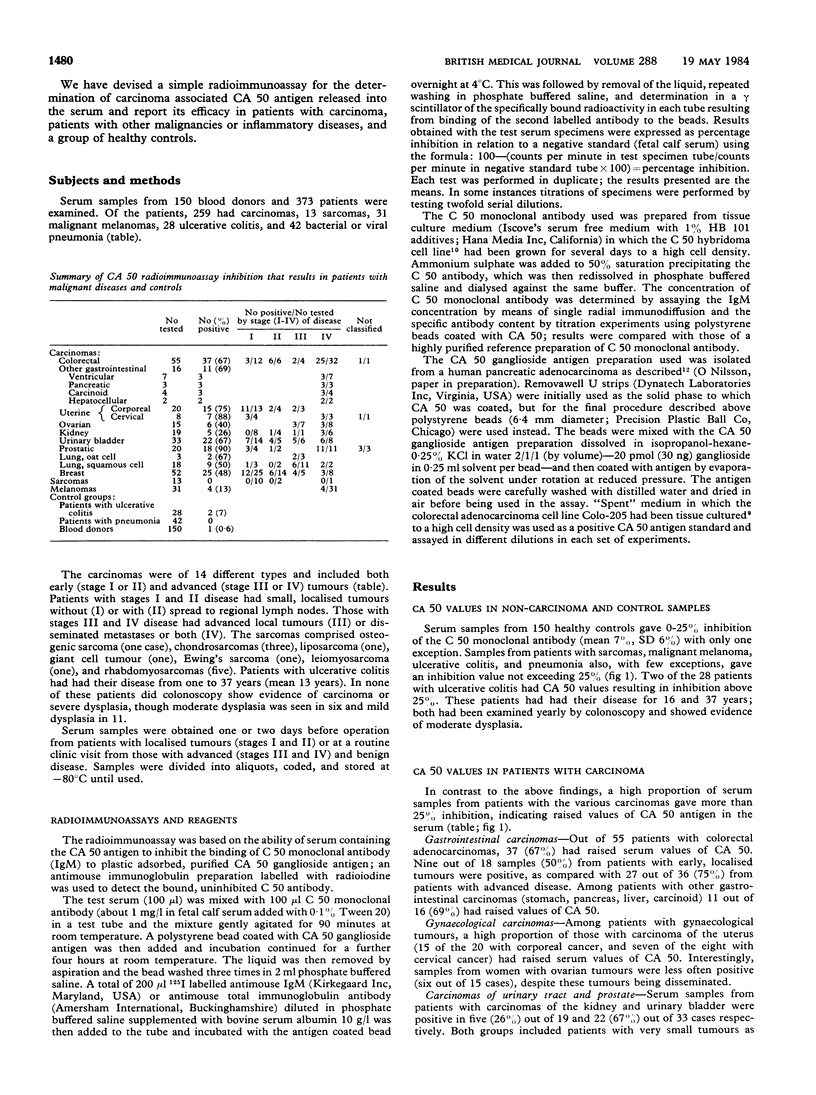Abstract
A solid phase radioimmunoassay was devised for measuring the value of the carcinoma associated carbohydrate antigen CA 50 in serum based on the use of a specific monoclonal antibody (C 50). Samples of serum from 259 patients with carcinoma, 114 patients with other malignancies or inflammatory diseases, and 150 healthy controls were examined. Serum values of CA 50 exceeding the mean plus three standard deviations for control samples from blood donors were found in a high proportion of patients with colorectal adenocarcinomas (50% of those with early, localised tumours and 75% of advanced cases), other gastrointestinal carcinomas (69%), uterine cancer (75% of those with corporeal and 88% of those with cervical cancer), prostatic cancer (90%), lung cancer (52%), and breast, ovarian, kidney, and urinary bladder carcinoma (26-67%). The CA 50 values in samples from patients with inflammatory diseases, including ulcerative colitis, with rare exceptions (0-7%) were within the normal range, as were those in patients with various sarcomas and malignant melanoma. Measuring serum values of CA 50, which is evidently a generalised carcinoma associated antigen, may be useful in clinical research studies of the diagnosis, management, and prognosis of patients with different types of carcinoma.
Full text
PDF



Selected References
These references are in PubMed. This may not be the complete list of references from this article.
- Cuttitta F., Rosen S., Gazdar A. F., Minna J. D. Monoclonal antibodies that demonstrate specificity for several types of human lung cancer. Proc Natl Acad Sci U S A. 1981 Jul;78(7):4591–4595. doi: 10.1073/pnas.78.7.4591. [DOI] [PMC free article] [PubMed] [Google Scholar]
- Fredman P., Nilsson O., Svennerholm L., Myrvold H., Persson B., Pettersson S., Holmgren J., Lindholm L. Colorectal carcinomas have a characteristic ganglioside pattern. Med Biol. 1983 Feb;61(1):45–48. [PubMed] [Google Scholar]
- Hakomori S. Glycosphingolipids in cellular interaction, differentiation, and oncogenesis. Annu Rev Biochem. 1981;50:733–764. doi: 10.1146/annurev.bi.50.070181.003505. [DOI] [PubMed] [Google Scholar]
- Hedin A., Carlsson L., Berglund A., Hammarström S. A monoclonal antibody-enzyme immunoassay for serum carcinoembryonic antigen with increased specificity for carcinomas. Proc Natl Acad Sci U S A. 1983 Jun;80(11):3470–3474. doi: 10.1073/pnas.80.11.3470. [DOI] [PMC free article] [PubMed] [Google Scholar]
- Herlyn M., Sears H. F., Steplewski Z., Koprowski H. Monoclonal antibody detection of a circulating tumor-associated antigen. I. Presence of antigen in sera of patients with colorectal, gastric, and pancreatic carcinoma. J Clin Immunol. 1982 Apr;2(2):135–140. doi: 10.1007/BF00916897. [DOI] [PubMed] [Google Scholar]
- Huang L. C., Brockhaus M., Magnani J. L., Cuttitta F., Rosen S., Minna J. D., Ginsburg V. Many monoclonal antibodies with an apparent specificity for certain lung cancers are directed against a sugar sequence found in lacto-N-fucopentaose III. Arch Biochem Biophys. 1983 Jan;220(1):318–320. doi: 10.1016/0003-9861(83)90417-4. [DOI] [PubMed] [Google Scholar]
- Koprowski H., Herlyn M., Steplewski Z., Sears H. F. Specific antigen in serum of patients with colon carcinoma. Science. 1981 Apr 3;212(4490):53–55. doi: 10.1126/science.6163212. [DOI] [PubMed] [Google Scholar]
- Koprowski H., Steplewski Z., Mitchell K., Herlyn M., Herlyn D., Fuhrer P. Colorectal carcinoma antigens detected by hybridoma antibodies. Somatic Cell Genet. 1979 Nov;5(6):957–971. doi: 10.1007/BF01542654. [DOI] [PubMed] [Google Scholar]
- Lindholm L., Holmgren J., Svennerholm L., Fredman P., Nilsson O., Persson B., Myrvold H., Lagergård T. Monoclonal antibodies against gastrointestinal tumour-associated antigens isolated as monosialogangliosides. Int Arch Allergy Appl Immunol. 1983;71(2):178–181. doi: 10.1159/000233384. [DOI] [PubMed] [Google Scholar]
- Magnani J. L., Nilsson B., Brockhaus M., Zopf D., Steplewski Z., Koprowski H., Ginsburg V. A monoclonal antibody-defined antigen associated with gastrointestinal cancer is a ganglioside containing sialylated lacto-N-fucopentaose II. J Biol Chem. 1982 Dec 10;257(23):14365–14369. [PubMed] [Google Scholar]
- Pukel C. S., Lloyd K. O., Travassos L. R., Dippold W. G., Oettgen H. F., Old L. J. GD3, a prominent ganglioside of human melanoma. Detection and characterisation by mouse monoclonal antibody. J Exp Med. 1982 Apr 1;155(4):1133–1147. doi: 10.1084/jem.155.4.1133. [DOI] [PMC free article] [PubMed] [Google Scholar]
- Yeh M. Y., Hellström I., Abe K., Hakomori S., Hellström K. E. A cell-surface antigen which is present in the ganglioside fraction and shared by human melanomas. Int J Cancer. 1982 Mar 15;29(3):269–275. doi: 10.1002/ijc.2910290308. [DOI] [PubMed] [Google Scholar]


